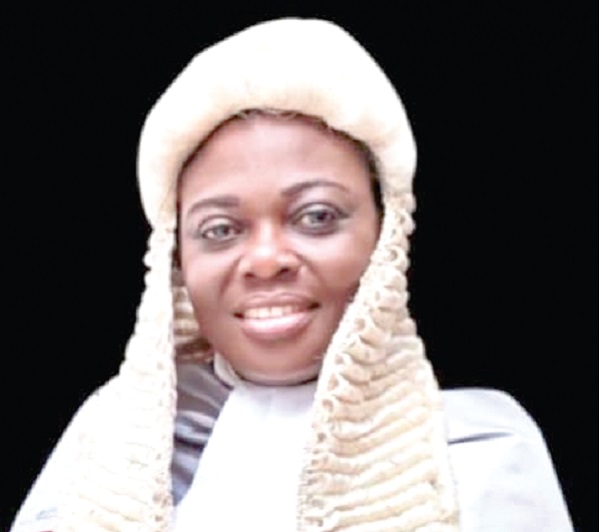
International Day of Women Judges - Celebrating Justice Georgina Mensah-Datsa, trailblazer in law
March 10 is marked globally as the International Day of Women Judges, and to mark the day, the Daily Graphic profiles Justice Georgina Mensah-Datsa.
Advertisement
Justice Georgina Mensah-Datsa is a Justice of the Court of Appeal and has been at the bench for more than 20 years.
She was called to the bar in 1996 after passing the bar exam, and worked briefly in private practice for about four years before joining the bench as a Community Tribunal Chairman.
Through dint of hard work, she has risen through the ranks and is currently a Presiding Judge at the Court of Appeal in Kumasi, where the Court sits on appeal cases from the Bono, Bono East, Ahafo, Ashanti and Western North regions.
Justice Mensah-Datsa had her primary education at Bolga Preparatory School and moved to Bolgatanga Girls’ Secondary School and Tamale Secondary School.
She had her LLB from the University of Ghana.
Since joining the bench, she has had the opportunity to undertake further studies, first at the prestigious Harvard University, where she obtained her first Master’s Degree in
Human Rights related studies.
When Ghana discovered oil in commercial quantities, she, together with the late Justice Samuel Marful-Sau, was sponsored by the Government of Ghana to the University of Dundee, Scotland, where she obtained her second Master’s Degree in Petroleum Law and Policy.
Experience
Since joining the bench in the year 2000, Justice Mensah-Datsa has worked with the district courts, High Court and now at the Court of Appeal.
She was the first judge to serve at the Gender-based Violence Court, where she sat on cases involving domestic violence and child neglect, among others.
At the High Court, she worked at the Commercial High Court, Tax Court, Human Right Courts, Financial and Economic Crime Court and the Criminal Court, where she handled lots of high profile cases including the defamation involving Ibrahim Mahama versus Ernest Owusu Bempah and Despite Media, as well as the former Chief Executive Officer (CEO) of COCOBOD, Dr Stephen Opuni’s, appeal to unfreeze his accounts.
Hobbies
In spite of her tight schedule, she still finds time to read novels and is a Manchester United fan.
Aside football, she plays long tennis and her favourite tennis player of all time is Roger Federer, “because he is not only an excellent player but also a great human being.
His humility is something to learn and that makes him the darling man of tennis.
He is just to be loved.”
Her current tennis player is Carlos Alcaraz Garfia of Spain.
“He is just 19, but that guy is the No.1 player for the men and is something else.
When you watch Alcaraz play, you will definitely fall in love with tennis,” she said.
She also loves flowers and “when I have time, I attend to my gardens at home.”
She is married, with a daughter, Mawuena, a final year at the Kwame Nkrumah University of Science and Technology, who, just like her mother, wants to become a lawyer.
Media
Sharing her view on the role of the media in the justice delivery system, Justice Mensah-Datsa said the media was an important stakeholder in the justice delivery system, “and when they do not play their role well, it negatively affects the delivery of justice.”
According to her, the media was very critical in the justice delivery system as they informed the public of cases before the courts.
“Without the media reportage, nobody knows what is happening.
They are so important and as such should take their work seriously.
Because they keep joking and trivialising sexual abuse, it is showing insensitivity towards the victims,” she said.
Circumspect
She said there was the need for the media to be very professional in how they handled gender-based violence cases so as not to deter the victims from seeking justice.
She cited an incident where a woman, who was then a PhD student in Psychology, was abused by her husband in a very dehumanising way.
She said the case came to her court, but the victim declined pursuing the case due to how the media portrayed the case and even described her neighbourhood.
She said it was because how the media reported the case that the victim decided not to seek justice and, therefore, stressed the need for the media to be professional in the discharge of their duties.
“So, if in reporting the media is not sensitised, trained on what not to report because of the negative consequences of what would happen, in the end, they (media) would be doing more harm than good,” she stated.
She explained that if the media continued to make fun of cases of sexual abuse, it would deter victims from reporting the cases and the perpetrators would go unpunished.



